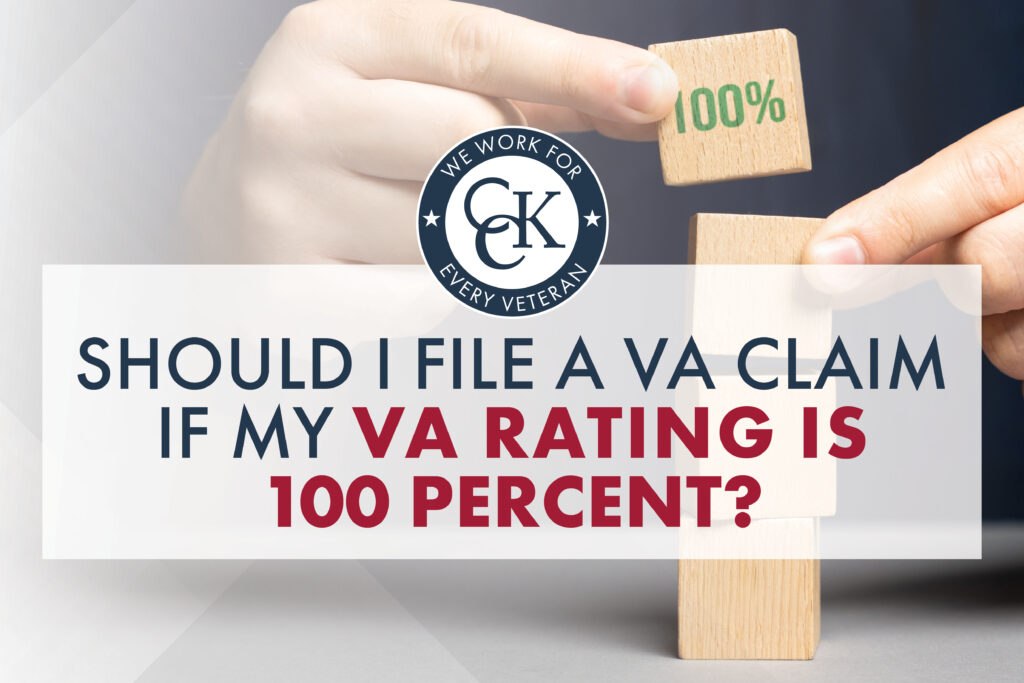Should Veterans File a VA Claim If Their VA Rating Is Already 100 Percent?

CCK Law: Our Vital Role in Veterans Law
A 100 percent disability rating from the Department of Veterans Affairs (VA) signifies that a veteran’s service-connected conditions are completely disabling, entitling them to the maximum schedular compensation. As of 2025, this amounts to $3,831.30 per month for a veteran without dependents. A total disability rating also grants access to additional benefits, including priority healthcare, educational assistance for dependents, and commissary privileges.
Even with a maximum disability rating, there are circumstances where filing additional claims may be advantageous. However, there are potential downsides for veterans to consider as well.
Reasons to File Additional Claims With a 100 Percent Rating
Veterans with 100 percent disability ratings may wish to file additional claims for a number of reasons.
- To Receive Compensation Above 100 Percent: VA offers Special Monthly Compensation (SMC) for specific disabilities that result in severe impairment—such as the loss of use of limbs or sensory organs—or when the veteran is bedridden or otherwise requires another individual’s help to carry on their daily lives (Aid & Attendance). In most cases, these benefits are provided in addition to the standard compensation rates, because they are intended to address unique circumstances that the regular rating schedule does not cover.
- To Qualify for Other Special VA Benefits: VA does offer some benefits based specifically on what conditions that a veteran has. Examples include the VA specially adapted housing grant and VA automotive adaptive equipment grant. To qualify for these, a veteran may need to file an additional claim for a relevant condition, even if they are already rated at 100 percent.
- As Protection Against Future Reductions: Establishing service connection for additional disabilities could help if VA ever reduces the rating for one condition. The other service-connected conditions could help maintain the veteran’s rating.
- To Move from TDIU to Permanent & Total Status: Total Disability Based on Individual Unemployability (TDIU), otherwise known as Individual Unemployability, grants compensation equivalent to total disability, even though a veteran’s actual rating does not equal 100 percent. However, TDIU status does have some limitations. For example, TDIU status is lost if the veteran makes more than marginal income. Also, TDIU does not qualify veterans for some benefits offered to totally disabled veterans, primarily at the state level. So if a veteran with TDIU status feels that they may qualify for permanent and total status, these may be reasons to file additional claims.
What Are Common Claims That Veterans File at 100 Percent
Some of the most common claims or actions that veterans take with a 100 percent rating include:
- Appeal: If a veteran’s claim was denied, or the veteran feels they were rated incorrectly, veterans have one year from the date of the decision letter to file an appeal. A veteran has three review options to choose from: the higher-level review lane, the supplemental claim lane, and the Notice of Disagreement lane (i.e., Appeal to the Board of Veterans’ Appeals).
- New Claim: Disabled veterans who have a rating but are filing new claims should be aware that evidence to support the claim must be “new and relevant,” in relation to evidence used for earlier claims.
- Secondary Service Connection: If a veteran develops a new condition that is a result of an already service-connected disability, they may be eligible for secondary service connection. For instance, if a veteran with a service-connected knee injury develops a back condition due to altered gait, the back condition could be considered secondary.
Caution: Considerations Before Filing Additional Claims
It is possible for a veteran to have their rating reduced after filing a new claim.
When a veteran files a new claim, VA may review the veteran’s entire claim file. (One reason for this is to avoid pyramiding—see video below—which is being compensated twice for the same set of symptoms.) If VA feels the veteran’s condition has actually improved or that VA initially assigned too high of a rating, VA reserves the right to decrease the veteran’s disability rating.
Therefore, before filing a claim for an increased rating, a veteran should:
- Research their condition and its potential ratings to ensure that a claim would improve their situation
- Talk to their doctor and VA-accredited representative about how realistic their request is
- Make sure they have evidence to support their claim or appeal
NOTE: Certain ratings have protections against reduction or severance, especially those in place for extended periods (.DOCX).

Call CCK Law
While a 100 percent disability rating provides substantial benefits, filing additional claims can sometimes be highly advantageous. But you should carefully assess your individual circumstances and consult with experienced, VA-accredited representatives to make informed decisions.
Note that VA-accredited law firms are allowed to assist you in many of the circumstances described above, such as when you are appealing or otherwise filing for benefits that you should have been offered during your initial claim (e.g., SMC).
Chisholm Chisholm & Kilpatrick has extensive experience guiding veterans through these complex situations. We will use our resources and access to fight for you to receive your full benefits—while minimizing the risks—in the most time-efficient ways possible. Contact us at 800-544-9144 or online today for a free case evaluation.
About the Author
Share this Post
